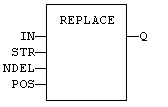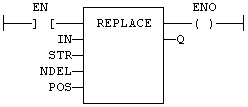
![]() A function calculates a result according to the current value of its inputs. A function has no internal data and is not linked to declared instances. - Replace characters in a string.
A function calculates a result according to the current value of its inputs. A function has no internal data and is not linked to declared instances. - Replace characters in a string.
Inputs
IN : STRING Character string
STR : STRING String containing the characters to be inserted
in place of NDEL removed
characters
NDEL : DINT Number of characters to be deleted before insertion of STR
POS : DINT Position where characters are replaced (first character position is 1)
Outputs
Q : STRING Modified string.
Remarks
The first valid character position is 1. In FFLD language, the operation is executed only if the input rung (EN) is TRUE. The output rung (ENO) keeps the same value as the input rung.
In IL![]() "Instruction list"
This is a low-level language and resembles assembly, the first input (the string) must be
loaded in the current result before calling the function. Other arguments are operands of
the function, separated by comas.
"Instruction list"
This is a low-level language and resembles assembly, the first input (the string) must be
loaded in the current result before calling the function. Other arguments are operands of
the function, separated by comas.
ST Language
Q := REPLACE (IN, STR, NDEL, POS);
FBD Language

FFLD Language
(* The function is executed only if EN is TRUE *)
(* ENO keeps the same value as EN *)

IL Language:
See also







